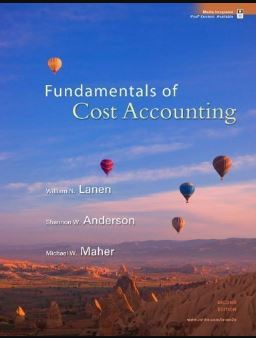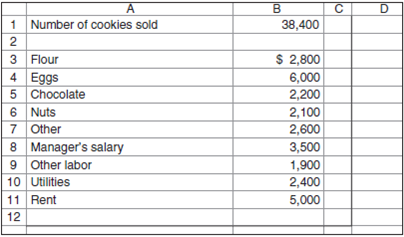
Fundamentals of Cost Accounting 2nd Edition by William Lanen, Carolyn Wells, Michael Maher
Edition 2ISBN: 978-0077274993
Fundamentals of Cost Accounting 2nd Edition by William Lanen, Carolyn Wells, Michael Maher
Edition 2ISBN: 978-0077274993 Exercise 10
Cost Data for Managerial Purposes-Budgeting
Refer to Exhibit 1.5. Assume that Carmen's Cookies is preparing a budget for the month ending September 30. Management prepares the budget by starting with the actual results for April that appear in Exhibit 1.5. Then, management considers what the differences in costs will be between April and September.
Management expects cookie sales to be 20 percent greater in September than in April, and it expects all food costs (e.g., flour, eggs) to be 20 percent higher in September than in April because of the increase in cookie sales. Management expects "other" labor costs to be 25 percent higher in September than in April, partly because more labor will be required in September and partly because employees will get a pay raise. The manager will get a pay raise that will increase the salary from $3,000 in April to $3,500 in September. Utilities will be 5 percent higher in September than in April. Rent will be the same in September as in April.
Now, fast forward to early October and assume the following actual results occurred in September:

Required
a. Prepare a statement like the one in Exhibit 1.5 that compares the budgeted and actual costs.
b. Suppose that you have limited time to determine why actual costs are not the same as budgeted costs. Which three cost items would you investigate to see why actual and budgeted costs are different Why would you choose those three costs
Refer to Exhibit 1.5. Assume that Carmen's Cookies is preparing a budget for the month ending September 30. Management prepares the budget by starting with the actual results for April that appear in Exhibit 1.5. Then, management considers what the differences in costs will be between April and September.
Management expects cookie sales to be 20 percent greater in September than in April, and it expects all food costs (e.g., flour, eggs) to be 20 percent higher in September than in April because of the increase in cookie sales. Management expects "other" labor costs to be 25 percent higher in September than in April, partly because more labor will be required in September and partly because employees will get a pay raise. The manager will get a pay raise that will increase the salary from $3,000 in April to $3,500 in September. Utilities will be 5 percent higher in September than in April. Rent will be the same in September as in April.
Now, fast forward to early October and assume the following actual results occurred in September:

Required
a. Prepare a statement like the one in Exhibit 1.5 that compares the budgeted and actual costs.
b. Suppose that you have limited time to determine why actual costs are not the same as budgeted costs. Which three cost items would you investigate to see why actual and budgeted costs are different Why would you choose those three costs
Explanation
a.
Prepare a statement like compares bu...
Fundamentals of Cost Accounting 2nd Edition by William Lanen, Carolyn Wells, Michael Maher
Why don’t you like this exercise?
Other Minimum 8 character and maximum 255 character
Character 255


